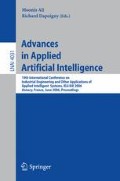Abstract
The paper proposes a variant of the A-Team architecture called PLA-Team. An A-Team is a problem solving architecture in which the agents are autonomous and co-operate by modifying one another’s trial solutions. A PLA-Team differs from other A-Teams with respect to strategy of generating and destroying solutions kept in the common memory. The proposed PLA-Team performance is evaluated basing on computational experiments involving benchmark instances of two well known combinatorial optimization problems – flow shop and job-shop scheduling. Solutions generated by the PLA-Team are compared with those produced by state-of-the-arts algorithms.
Access this chapter
Tax calculation will be finalised at checkout
Purchases are for personal use only
Preview
Unable to display preview. Download preview PDF.
References
Aydin, M.E., Fogarty, T.C.: Teams of autonomous agents for job-shop scheduling problems: An Experimental Study. Journal of Intelligent Manufacturing 15(4), 455–462 (2004)
Aydin, M.E., Fogarty, T.C.: A simulated annealing algorithm for multi-agent systems: a job-shop scheduling application. Journal of Intelligent Manufacturing 15(6), 805–814 (2004)
Czarnowski, I., Jędrzejowicz, P.: Application of the Parallel Population Learning Algorithm to Training Feed-forward ANN. In: Sincak, P. (ed.) Intelligent Technologies - Theory and Applications, pp. 10–16. IOS Press, Amsterdam (2002)
Jędrzejowicz, P.: Social Learning Algorithm as a Tool for Solving Some Difficult Scheduling Problems. Foundation of Computing and Decision Sciences 24, 51–66 (1999)
Jędrzejowicz, J., Jędrzejowicz, P.: PLA-Based Permutation Scheduling. Foundations of Computing and Decision Sciences 28(3), 159–177 (2003)
Jędrzejowicz, J., Jędrzejowicz, P.: New Upper Bounds for the Flowshop Scheduling Problem. In: Ali, M., Esposito, F. (eds.) IEA/AIE 2005. LNCS, vol. 3533, pp. 232–235. Springer, Heidelberg (2005)
Kolonko, M.: Some new results on simulated annealing applied to job shop scheduling problem. European Journal of Operational Research 113, 123–136 (1999)
Parunak, H.V.D.: Agents in Overalls: Experiences and Issues in the Development and Deployment of Industrial Agent-Based Systems. Intern. J. of Cooperative Information Systems 9(3), 209–228 (2000)
Rachlin, J., Goodwin, R., Murthy, S., Akkiraju, R., Wu, F., Kumaran, S., Das, R.: A-Teams: An Agent Architecture for Optimization and Decision-Support. In: Rao, A.S., Singh, M.P., Müller, J.P. (eds.) ATAL 1998. LNCS, vol. 1555, pp. 261–276. Springer, Heidelberg (1999)
Rajendran, C., Ziegler, H.: Ant-colony algorithms for permutation flowshop scheduling to minimize makespan/total flowtime of jobs. European Journal of Operational Research 1555, 426–438 (2004)
Ruiz, R., Maroto, C., Alcaraz, J.: New Genetic Algorithms for the Permutation Flowshop Scheduling Problems. In: Proc. The Fifth Metaheuristic International Conference, Kyoto, pp. 63-1–63-8 (2003)
Satake, T., Morikawa, K., Takahashi, K., Nakamura, N.: Simulated annealing approach for minimizing the makespan of the general job-shop. International Journal of Production Economics 60(61), 515–522 (1999)
Talukdar, S., Baerentzen, L., Gove, A., de Souza, P.: Asynchronous Teams: Co-operation Schemes for Autonomous, Computer-Based Agents, Technical Report EDRC 18-59-96, Carnegie Mellon University, Pittsburgh (1996)
Author information
Authors and Affiliations
Editor information
Editors and Affiliations
Rights and permissions
Copyright information
© 2006 Springer-Verlag Berlin Heidelberg
About this paper
Cite this paper
Jędrzejowicz, J., Jędrzejowicz, P. (2006). Agent-Based Approach to Solving Difficult Scheduling Problems. In: Ali, M., Dapoigny, R. (eds) Advances in Applied Artificial Intelligence. IEA/AIE 2006. Lecture Notes in Computer Science(), vol 4031. Springer, Berlin, Heidelberg. https://doi.org/10.1007/11779568_5
Download citation
DOI: https://doi.org/10.1007/11779568_5
Publisher Name: Springer, Berlin, Heidelberg
Print ISBN: 978-3-540-35453-6
Online ISBN: 978-3-540-35454-3
eBook Packages: Computer ScienceComputer Science (R0)

